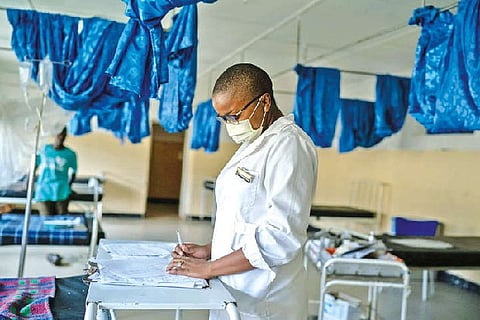

Johannesburg
I was a correspondent based in Johannesburg at the height of the African HIV epidemic, the last pandemic to batter this region. In the early 2000s, there were 28 million people living with the virus in sub-Saharan Africa, and about a third of young adults in Zambia were infected. More than 2 million Africans were dying of AIDS each year. HIV had long since become a treatable illness in wealthy nations, but here the price of antiretrovirals was still more than $10,000 per person per year. Entirely, impossibly, unaffordable. Science, in the form of drugs quelled if not vanquished a deadly virus; along with a network of fierce, courageous activists; coordinated international efforts, including a huge investment by the U.S. government. We know how to do this.
In a clinic outside Cape Town, Linda-Gail Bekker, a renowned HIV researcher, mentioned to me almost in passing that “our longevity is back.” When I asked what she meant, she showed me the data: The life expectancy of South Africans, which HIV drove down from 63 in 1990 to a low point of 53 in 2004, has risen steadily since treatment began to be delivered by the public health system, and will pass 66 this year. This was just one of a dozen interactions I had that I could not have imagined 25 years ago, when I began covering HIV in Africa.
In a public clinic in Soweto on my recent trip, I spent time with a community health care worker named Nelly Zulu, who told me that when people test positive for HIV at the clinic where she works, they are given their first pills to suppress the virus that day: no more of the grim wait I used to watch, as people tracked the decline of their immune systems until they qualified for the scarce drugs.
Nelly also told me that the number of positive cases was falling. She and her co-workers said they attributed this in part to pre-exposure prophylaxis, better known as PrEP. It’s an antiretroviral taken every day that helps keep people from being infected if they are exposed to HIV. Gay men in the US have been using it for years, but it’s only recently come to Africa. Nelly and her colleagues said that women came to her clinic asking for it: “the ones who have older boyfriends who they can’t trust.”In Durban, I happened to visit a clinic as nurses were screening young women volunteering for the first clinical trial of a South African broadly neutralizing antibody to fight HIV, which researchers hope could be the key to new drugs to prevent infection, new treatments that would be easier to take, and perhaps even a cure.
AIDS is far from over. COVID has caused a disruption in testing, interrupted drug delivery and undermined livelihoods in ways that make people more vulnerable to that other virus, too. An estimated 700,000 Africans were newly infected this year. But HIV has been significantly beaten back. It’s a credit to former President George W. Bush’s PEPFAR program and the money it poured into treatment. And to brilliant scientists such as those in Durban and Cape Town.
I’m taking heart in what I saw: proof of human resilience and ingenuity, a reminder that the timeline in a battle with a virus is not short — not nearly as short as we would like it to be. But it is possible to come out the other side, into a future we can barely envision right now.
Visit news.dtnext.in to explore our interactive epaper!
Download the DT Next app for more exciting features!
Click here for iOS
Click here for Android